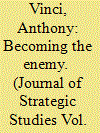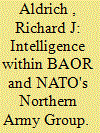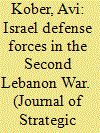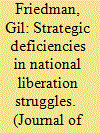| Srl | Item |
| 1 |
ID:
080866


|
|
|
|
|
| Publication |
2008.
|
| Summary/Abstract |
The United States and Al Qaeda represent two fundamentally different forms of warfare. The US, with its basis in the Western way of warfare, relies on an almost totally instrumental form of warfare and Al Qaeda, with its basis in the Islamic way of warfare, fights an expressive, existential form of warfare. This paper illustrates how both sides' ways of warfare are converging toward each other. It also argues that this is in fact a good thing because it will allow the US to understand its enemy and thereby allow the US to defeat him in terms he can understand
|
|
|
|
|
|
|
|
|
|
|
|
|
|
|
|
| 2 |
ID:
080867


|
|
|
|
|
| Publication |
2008.
|
| Summary/Abstract |
During the Cold War the UK's principal military role was its commitment to the North Atlantic Treaty Organisation (NATO) through the British Army of the Rhine (BAOR), together with wartime command of NATO's Northern Army Group. The possibility of a surprise attack by the numerically superior Warsaw Pact forces ensured that great importance was attached to intelligence, warning and rapid mobilisation. As yet we know very little about the intelligence dimension of BAOR and its interface with NATO allies. This article attempts to address these neglected issues, ending with the impact of the 1973 Yom Kippur War upon NATO thinking about warning and surprise in the mid-1970s. It concludes that the arrangements made by Whitehall for support to BAOR from national assets during crisis or transition to war were - at best - improbable. Accordingly, over the years, BAOR developed its own unique assets in the realm of both intelligence collection and special operations in order to prepare for the possible outbreak of co
|
|
|
|
|
|
|
|
|
|
|
|
|
|
|
|
| 3 |
ID:
080864


|
|
|
|
|
| Publication |
2008.
|
| Summary/Abstract |
Whereas in the past, Israeli successes on the battlefield compensated for deterrence and/or early warning failures, in the Second Lebanon War serious problems in Israeli military capabilities and conduct of war were exposed. The article offers explanations for the poor performance of the Israel Defense Forces (IDF): A late perception that it was war; adherence to post-heroic warfare under circumstances that rather required a different approach; the erosion of the IDF's fighting standards due to policing missions which had become its main task since the outbreak of the first Intifada in 1987; false Revolution in Military Affairs-inspired concepts; the adoption of the notion of controlling instead of capturing territory; a centralized logistic system; poor generalship; a hesitant and inexperienced political leadership, and IDF dominance in decisions on military matters
|
|
|
|
|
|
|
|
|
|
|
|
|
|
|
|
| 4 |
ID:
080868


|
|
|
|
|
| Publication |
2008.
|
| Summary/Abstract |
In light of present day calls for increased levels of cultural understanding on the part of Western forces engaged in conflict, this article assesses the utility of such knowledge in light of the British experience of the North-West Frontier of India 1901-1945. By using the British concept of the Political Officer as an example, it proposes that while cultural understanding is of genuine importance when operating in such a challenging environment, possession of it does not necessarily aid either the design or implementation of successful policy. As the British experience on the Frontier during this period illustrates, cultural awareness and understanding may be possessed in abundance, and the mechanisms for achieving such a state of understanding may be advanced, but traditional factors such as a cultural bias on the part of policy-makers, conservatism, underfunding, local resistance to unfamiliar concepts and a fractured civil-military relationship will dominate such awareness and overshadow the benefits that it may provide.
|
|
|
|
|
|
|
|
|
|
|
|
|
|
|
|
| 5 |
ID:
080865


|
|
|
|
|
| Publication |
2008.
|
| Summary/Abstract |
This study reports and explains a cluster of deviations from the basic rational criteria of national liberation strategy exhibited by 'inside' West Bank Fatah leaders during the al-Aqsa uprising, based on an analysis of public statements of three such leaders. The leaders fail to recognize that their attempt to deter Israeli offensives by threatening to reciprocate them with attacks inside the Green Line is sabotaged by Islamists independently attacking inside the Green Line; inadequately attend to the distinct possibility that attacks within the Green Line increase Israeli opposition to desired concessions on refugees and territory; and appear to occasionally get swept-up in the sentiment that reciprocating Israeli aggression is inherently just. The study elaborates and examines the possible roles in these strategic deficiencies of leader strategic desperation; rage and indignation; and the political need to satisfy widespread popular militancy. The study's logic complements existing asymmetric conflict research and can inform research beyond the Palestinian-Israeli case.
|
|
|
|
|
|
|
|
|
|
|
|
|
|
|
|